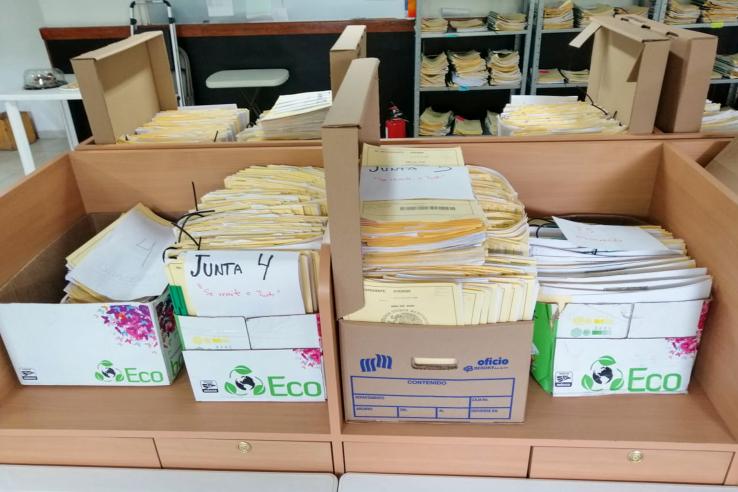
Pandemic provides unprecedented opportunities to take justice online

Labor courts in Mexico and many other low- and middle-income countries often provide low quality services, including long delays in processing cases, opaque procedures, and poor information provided to parties about their procedures. Since 2015, we (Joyce Sadka (ITAM), Enrique Seira (ITAM), and Christopher Woodruff (Oxford)) have partnered with the Mexico City Labor Court (MCLC), one of the largest courts dealing with firing cases in Latin America, to innovate in improving the court’s functioning.
Between 2016 and 2019, we ran three randomized evaluations that provided parties with better information on labor rights, conflict resolution procedures, and on how similar parties fared in past lawsuits.
These evaluations provided key scientific evidence to lawmakers, who in 2018 passed a major labor law reform in Mexico. When authorities and stakeholders formed a legislative advisory group to draft large portions of the law, we were invited to participate. This contributed to the conciliation procedures that had been tested in the evaluations being adopted as law.
Currently, a fourth evaluation focuses on testing the rotation of work assignments among court notifiers, an innovation also included in the new law due to the researchers’ involvement. The main intervention seeks to break the monopoly power of reputedly corrupt notifiers, who are responsible for a large portion of the delay in labor suits.
Mexican labor courts face unprecedented challenges due to COVID-19
COVID-19 exacerbates existing problems and brings new challenges to labor courts. Mexico will lose more than one million formal sector jobs in 2020, according to the Mexican Social Security Institute, with some 35 to 40 percent of these jobs lost in the jurisdiction of the MCLC.
Even if as few as 5 percent of these dismissed workers choose to sue, this could lead to fifteen to twenty thousand additional lawsuits received by the MCLC, equivalent to an increase of 50 percent in its yearly lawsuits.
After a five month closure, the court will be swamped by workers and lawyers filing thousands of lawsuits, causing increased backlogs as well as health risks. Over 100,000 missed hearings need to be rescheduled. Due to sanitary restrictions, the court may only allow one-third of the usual daily visitors into its premises. These challenges demand innovative online solutions to avoid a massive increase in lawsuit delays.
Imagining better systems for justice provision—at a distance
To provide justice and help resolve the growing number of labor conflicts, the court needs help with creating various online systems to provide services remotely to parties and lawyers. We are already helping the MCLC to design and program the first of these: an online suing system, in which the plaintiff (worker) or her lawyer codes all the relevant variables for processing the lawsuit and provides the lawsuit in PDF format. This system will allow hundreds of individuals who file suits daily to take this step without going to the court.
Parties will also provide new information to the court, such as telephone and email contact information to allow electronic communication with court users, and information about wages and other labor conditions that will allow the court to direct online settlement negotiations.
A related system the court needs is an online system for conciliation meetings, that would include the electronic delivery of letters of appointment to both parties, videoconferencing, and an interface to create the settlement agreement and get it approved online. We believe scaling such a system could help settle over 1,000 labor conflicts per month, providing workers with severance pay immediately.
Each day up to 100 workers arrive at the court to ask about their labor rights. Due to the restrictions on daily visitors, such workers will be turned away and will either lose the opportunity to pursue their rights or will be prey to informal, low-quality middlemen—lawyers at the court entrance.
An online system to provide advice on labor rights and procedures to solve disputes, in coordination with the free public labor lawyer’s office, could provide access to justice to these workers without endangering their health or putting a strain on the court’s capacity to handle physical visitors.
The court also needs an online appointment system for hearings and personal notifications. Notifying parties of scheduling changes in a timely fashion will allow the court to predict and regulate the flow of visitors, while holding all notified hearings on time. Online communication for all notifications after the first official court summons can spare the court notifiers thousands of weekly visits to parties’ addresses, reducing delay in case resolution.
An extraordinary opportunity to innovate
The response to the COVID crisis can have a permanent, positive effect on access to justice through the digitization of procedures often plagued by inefficiency and corruption. We are working with the MCLC to push forward necessary changes that were unthinkable or less feasible before the pandemic.
The need for these innovations existed long before the pandemic began, but the timing has never been more important. Providing justice through remote procedures and managing an increasing large number of lawsuits is now essential to both the court’s survival and to thousands of workers seeking to receive the justice to which they are entitled.
These changes will not only allow the court to face the demands of post-COVID labor justice. They will revolutionize access to justice and transparency permanently.


